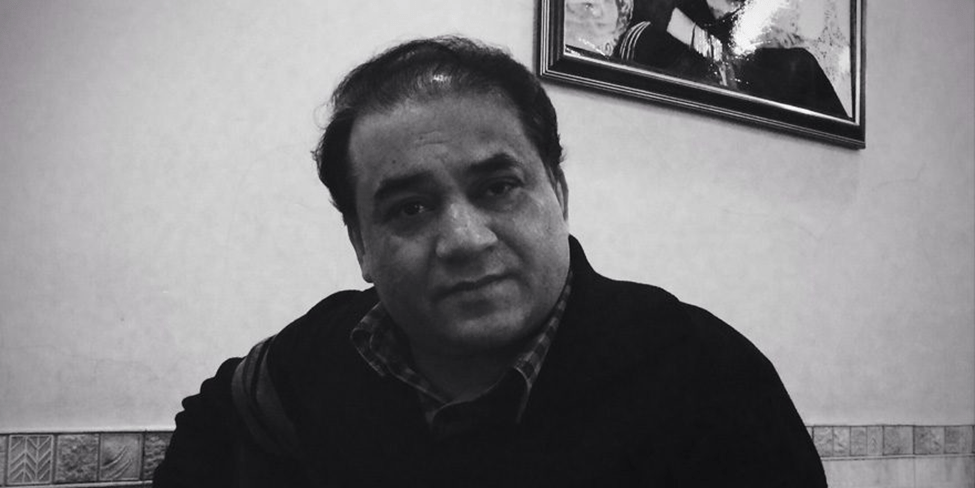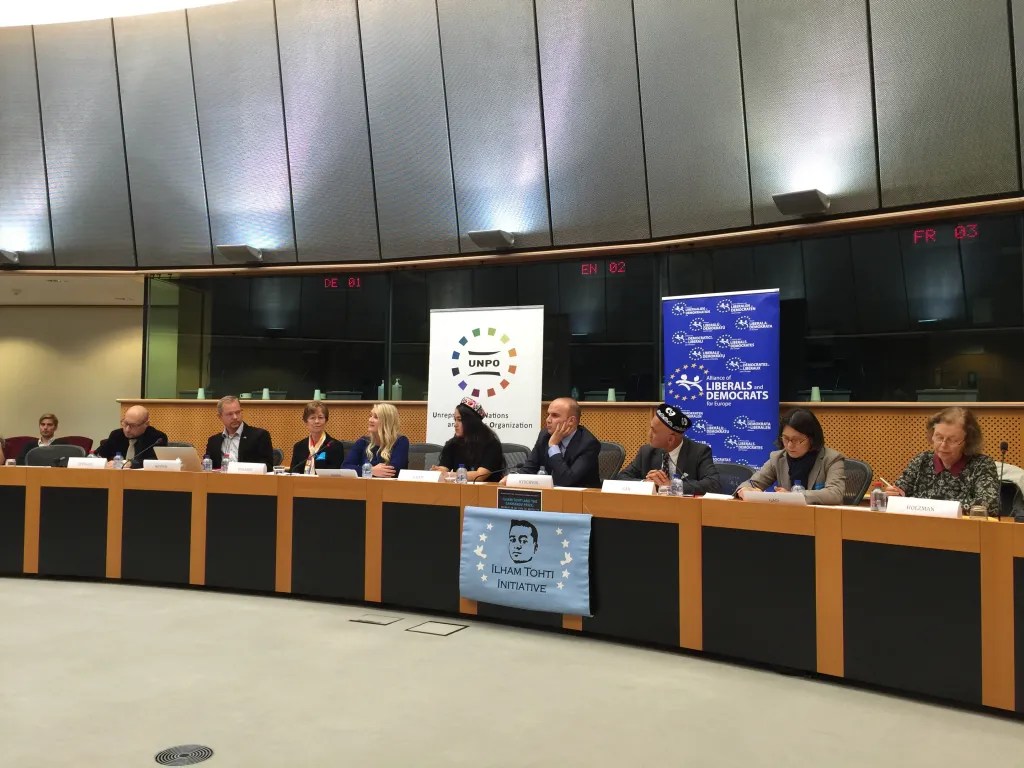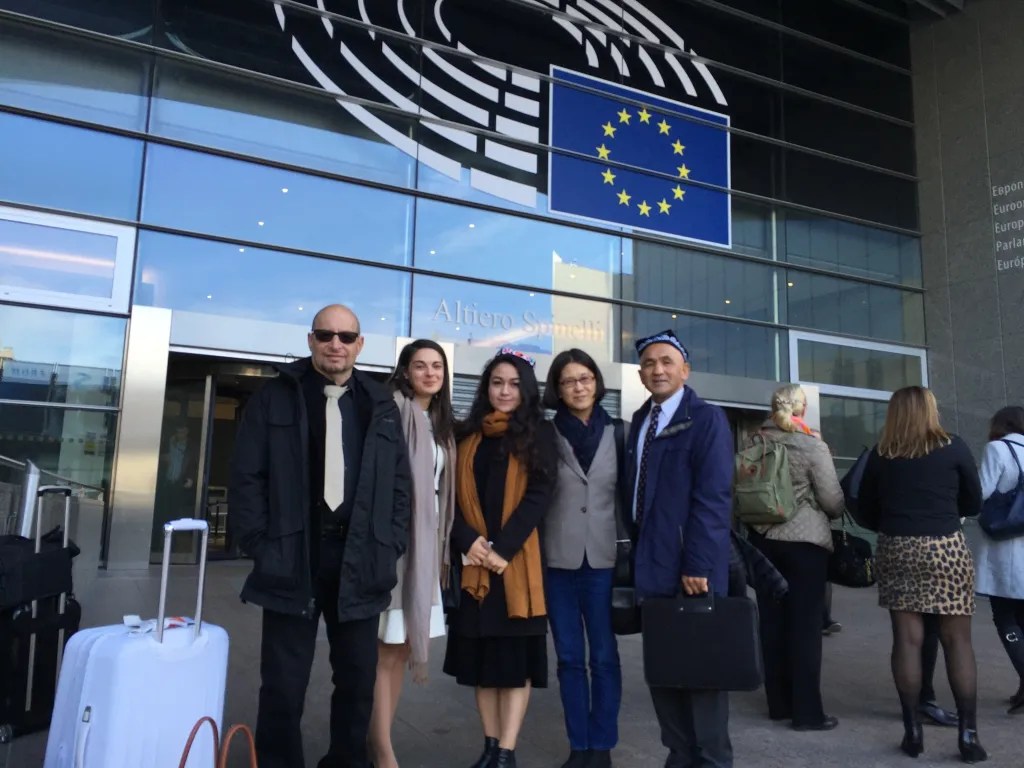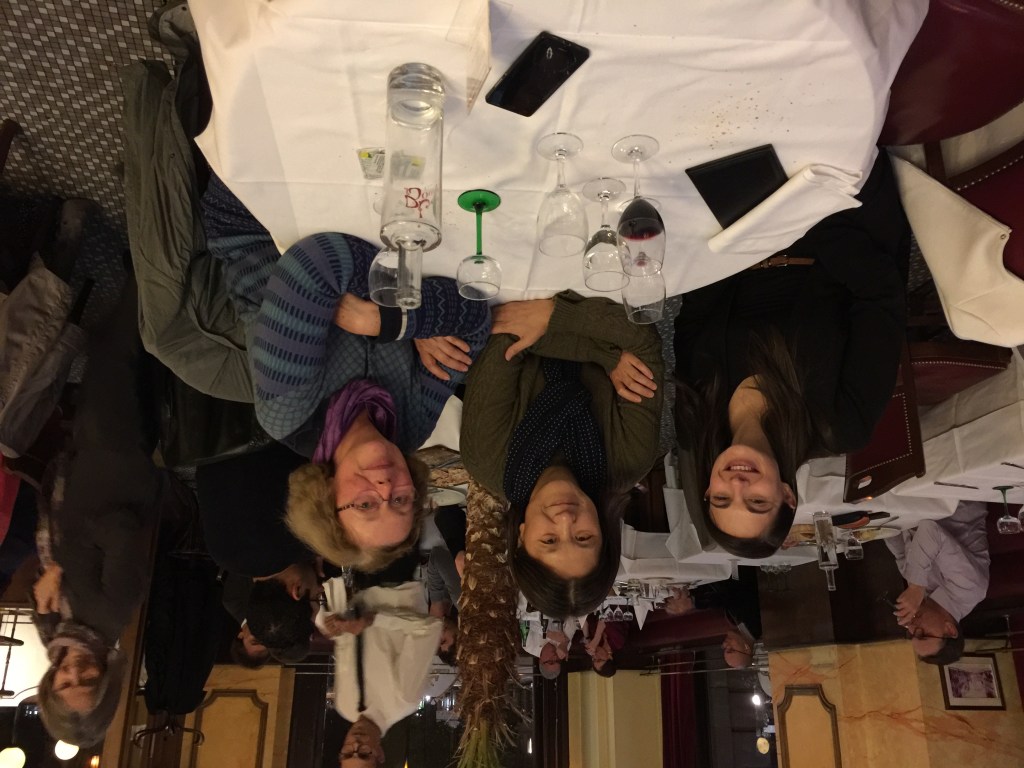Ilham, My Brother
Ilham, My Brother
Yaxue Cao, January 15, 2024

1.
People often automatically assume that I personally know Ilham Tohti. I don’t. When Ilham was arrested on January 15, 2014, I, a relative newcomer to human rights, barely knew his name.
I began to read about him. The first thing I read was his autobiographical essay My Ideals and the Career Path I Have Chosen. “I was born in 1969 into a Uighur family in Atush City, Kizilsu Kirghiz Autonomous Prefecture, Xinjiang Uyghur Autonomous Region,” he thus began. His father, a young communist cadre, died when he was two in factional fighting during the Cultural Revolution. It was the first event in Ilham’s childhood, and the point from which I drew the contour of Ilham’s life.
Ten years have passed since 2014. The last time we heard any news of him was in the fall of 2016. Nothing since. Nada. The walls surrounding Xinjiang First Prison at No. 215, Hebei East Road, in Urumqi, where he has been serving a life sentence, are impenetrable and becoming increasingly abstract.
Think about it: These ten years, from age 45 to 55 and counting, belong to the prime of a man and an intellectual, a time when life should have been lived to its fullest. The waste is heartbreaking.
2.
Despite his childhood tragedies, Ilham Tohit lived through the “best era” of the 70-year communist rule.
In 1985, at the age of 16, he was selected to study at Central Nationality University (now Minzu University) in Beijing to prepare for college. During the 1989 student democracy movement, he was a student at Northeastern Normal University in Changchun, Jilin Province. He made an oblique reference to the Tiananmen Movement in an article, and we can only supply from our imagination what impact it might have had on him. He graduated from college in 1991.
Ilham’s first job was to be a Communist Youth League secretary in a department at Minzu University. In 1994, he enrolled in the university’s Institute of Economics to study developmental economics. That was when he began to take a strong interest in economic and social issues in Xinjiang and published articles in newspapers and academic journals. He was a prolific author, and once proposed the idea of establishing a special economic zone in Kashgar.
He traveled throughout Central Asia, Russia, and South Asia and witnessed a great number of cases of ethnic conflict and killing, political unrest, and failed social transformation. “My desire grew stronger and stronger to completely devote my energies to researching Xinjiang and Central Asian issues, so that tragedies abroad wouldn’t be repeated in China.”
His first encounter with the police came in 1994 as soon as he started publishing as a graduate student. The state security agents from Xinjiang paid him an ominous visit in Beijing when they found that Ilham questioned the veracity of a lot of government data. The visit scared Ilham’s mother.
3.
Entering the 21st century, China was thriving. China joined the WTO, manufacturing was blossoming along the coastal provinces and in townships across the country as it morphed into the world’s factory. New highways and high-speed trains brought the vast land up to speed. Tall buildings rose from the ground. Young people thronged university halls and independent bookstores for stimulating lectures on political and economic thoughts. Free-thinking media outlets were on the march, exposing corruption and social ills. With the advent of the internet, blogs and online forums mushroomed, easily commanding millions of visitors daily, and many millions more discussions. Rights defense movement using legal means was rising. Though 2008 was a complicated year, it indeed filled many Chinese with hope, and 303 Chinese intellectuals, lawyers, dissidents signed Charter 08, a blueprint for political change.
Ilham was thriving. He was a popular young professor attracting students to his classes, not just from Minzu University where he taught but also from other campuses. He made friends with Chinese intellectuals known for their liberal ideas and an outlook for a free China. He once invited a human rights lawyer to his class. He founded and ran the Uyghur Online website with a group of students who adored him. He was a guest of foreign embassies in Beijing, along with artist Ai Weiwei, Tibetan writer Tsering Woeser, and other well-known public intellectuals. He visited France by invitation of the French Ministry of Culture.
He was a product of, and an active participant in, that vibrant decade which now increasingly looks like a mirage.
4.
“If I weren’t a Uyghur,” he told his friend Huang Zhangjin, a publisher and a renowned blogger who grew up in Xinjiang, “I would certainly say I’m a liberal. But I’m a Uyghur and I must first of all be a Uyghur nationalist.”
He studied Xinjiang ever more intensely, conducting field work back to his home region every summer. He saw that the policies in Xinjiang, dictated by the central government and aimed at limiting the Uyghurs, were alienating his people, and putting them in an ever more disadvantageous position economically and socially. He wrote policy recommendations in earnest and voiced his concerns. He opposed overuse of force and coercion in the name of “anti-terrorism.”
At Uyghur Online, a Chinese-language website, he brought more information from Xinjiang to Chinese readers who would never have found such content in state media or anywhere else. He moderated forums for Uyghurs and Chinese, urging rational conversations. He editorialized on history and current events. He wanted to break down the “Great Wall” that kept the Uyghur people outside.
In the back of his mind, he had suspected that the rulers of China had regarded the Uyghurs as the others, the aliens.
He was not wrong.
5.
The good time, if there ever was one for Ilham, came to a screeching halt on July 5, 2009. Uyghur Online was immediately accused of inciting the unrest along with overseas Uyghur organizations. Such accusations are patently irresponsible and absurd, and they did not solve any real issues and were not for the government’s own good.
And the hostility toward Uyghur Online and Ilham is the Communist Party’s reflex against free information flow and free speech.
Ilham was detained for some time following the July 5th unrest. He had already been barred from publishing; now his salary was reduced; his classroom was fitted with multiple surveillance cameras; police harassment became routine; on sensitive days he was forcefully removed from Beijing, and the like.
In short, he was getting the full treatment of a state enemy.
“The outbreak of the July 5 unrest in 2009 and, before it, the March 14 incident in Lhasa, Tibet, in 2008, clearly reminds us that as China is undergoing rapid changes, it is an extremely urgent task to explore how to achieve ethnic harmony,” he wrote.
“As a Uyghur scholar living in Beijing, where the legal environment is relatively better, I have a duty—one which I cannot rightly dismiss—to focus my attention on Xinjiang’s problems. This has always required not only knowledge and training, but above all courage.”
Readers already know the rest of the story.
Ilham’s story is also a China story. Those in Zhongnanhai might think it’s a good idea to throw Ilham into prison, but what they have really accomplished is to show the world how rotten the “China story” is.
Let me add that the law firm, Beijing Fengrui Law Firm, that provided two defense attorneys for Ilham, was targeted and destroyed during the infamous 709 crackdown on human rights lawyers in 2015.
“The objects of political persecution are precisely the very people most needed for the country’s future,” a journalist friend commented.
Indeed, China destroys its best.



6.
In the spring of 2015, I decided to work on getting Ilham Tohti nominated for the Sakharov Prize for Freedom of Thought. My calculation was simple: The European Parliament had awarded the Sakharov Prize to Chinese dissident Wei Jingsheng in 1996, and again to dissident and environmental activist Hu Jia in 2008, so wouldn’t it be about time to award it to another person from China?
With the help of many friends, I had a few dozen individuals and organizations signing a letter to the EP supporting the nomination, starting with His Holiness the Dalai Lama.
In the summer, I met for the first time Prof. Elliot Sperling and Jewher Ilham at Panera Bread at Columbia Heights in DC. They were in town from Bloomington, Indiana, to meet with State Department officials. Jewher was a college student, Elliot a renowned Tibet scholar who had befriended Ilham over beer on one of his trips to Beijing.
I told Elliot that I was going to Strasbourg in September. He looked at me quizzically. I instantly read his mind, “What’s this middle-aged Chinese woman going to do at the European Parliament? How do I know she’s not going to screw it up?”
After a moment of awkward silence, he said, “I’ll go too.”
I was immensely relieved. He had no idea how scared I was of going by myself.
In September, Elliot and I embarked on our first trip to Strasbourg, with him setting out from New York via Frankfurt, and I from Washington D.C. via Paris. In Paris, I visited Marie Holzman, a sinologist and long-time supporter of China’s democracy movement. Drinking tea at her dining table, I told her the plan.
“I’ll go with you,” she said softly, smiling. “You know, Ilham visited me before, and he sat in the same chair you are sitting in now.”
So, before getting to Strasbourg, we became a team of three. I felt encouraged.
7.
With the little time I had in Paris, I visited Notre Dame. Loitering about, I ended up sitting down in one of the small chapels in the back. Before I knew it, I prayed. For Ilham. I had never prayed before and didn’t know how to pray, but tears started welling up, so profusely that I had to wipe my face on my sleeves because I had no tissue paper with me.
I hesitate to relate this scene — I’m understandably embarrassed for a few reasons: the unstoppable tears in public aside, Ilham is a Muslim, and I was neither a Catholic nor a Christian.
On the other hand, does it really matter?
8.
In Strasbourg, my friend Su Yutong introduced us to Zsuzsa Ferenczy, an all-knowing political advisor in the European Parliament. The first things we learned were that it was too late for the year of 2015 and the letter I brought was useless (“No one reads it”). Zsuzsa gave us detailed advice on how to proceed next year. It was not going to be easy: For Ilham to be a nominee, either one of the seven political groups at the EP, or at least 40 MEPs across the groups, had to nominate him. Except for Zsuzsa, nobody we had spoken to in that labyrinthic building seemed to have heard the name Ilham Tohti before.
On my train back to Paris, I realized the complexity and difficulty of the whole nomination business, way beyond what I could possibly have imagined. I still remember the hazy sunset on that day as the train hurtled across the French countryside.
9.
When we returned to the European Parliament in early spring of 2016, our team grew to be five: Lucia, a young Italian woman with the Unrepresented Nations and Peoples Organization (UNPO) in Brussels, and Enver Can, a Uyghur and a retired Radio Free Europe broadcaster from Munich, joined us.
After rounds of lobbying, together and separately, it became clear to the team that no political group was going to nominate Ilham Tohti. Our goal then was to get 40 MEPs across the political groups. We worked out a list of likely supporters, over 100 of them, and Lucia, always in a rush and never tired, knocked on doors. Marie and Enver mobilized all the connections they had in Europe.
Not one day sooner than the date the nomination closed in October, we got 43 MEPs supporting the nomination, and Ilham became the 5th nominee, surprising the Secretariat of the European Parliament.
I sat in the back of the room where the Foreign Affairs Committee and the Development Committee convened to hear the presentation about the five nominees. Watching the five-minute video clip China Change made about Ilham, I was satisfied with our team’s work: Now that the European Parliament knows Ilham Tohti. If and when they managed to muster the political will to award another Sakharov Prize to someone from China, they would know who that person should be.
Ilham was the recipient of the Sakharov Prize in 2019. By then, the world had known that China had placed several millions of Uyghurs in concentration camps and prisons, subjecting them to torture, indoctrination, forced labor, and long prison sentences.
10.
For dinner, Elliot liked salmon, I schweinshaxe – roasted pork knuckle and sauerkraut. In the many conversations we had had, he kept saying, “A people who has been so brutalized must self-determine their future.” He referred to both Tibetans and Uyghurs.
I’m a disciple of his on self-determination.
“Academics are uncomfortable being activists. In fact, I think they despise activists,” I once said to Elliot, pointing out that he was surprisingly different. He said casually, “I’m first of all a person.”
He worked excessively, running around with the team in Brussel and Strasburg during the day, and in the evenings, fulfilling his teaching obligations, including advising a Ph.D. candidate. He had been acting as the guardian of Jewher, who had come to the U.S. on her own in early 2013, while her father on the same trip had been blocked at the Beijing International Airport.
One day, Elliot said, “A prize is nice, but what we want is just for Ilham to come back and be free.”
I agree. I honestly don’t attach too much import to this or that prize; all I want is for Ilham to come back to his children, who have grown up without him; to his wife who has endured too much; to his people the Uyghurs, and to this potpourri of brothers and sisters of his: an American Jew, a Frenchwoman, an Italian girl, a Uyghur retiree whose family escaped Xinjiang by scaling the Altai Mountains in the 1960s, and a random Chinese woman.
In Memory of Elliot Sperling, 1951 – 2017
Related:
Ilham, Wang Lixiong, July 29, 2023.
A Conversation With Ilham Tohti, Yaxue Cao, January 13, 2023





Comments are closed.